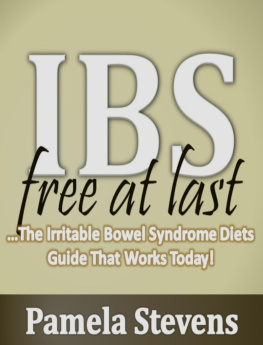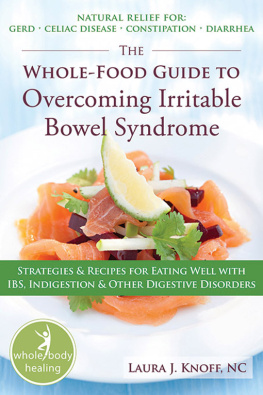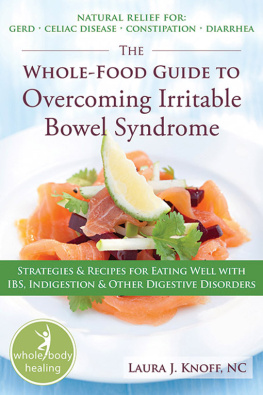
how to use this ebook
Select one of the chapters from the main contents list and you will be taken to a list of all the recipes covered in that chapter.
Alternatively, jump to the index to browse recipes by ingredient.
Look out for linked text (which is underlined and/or in a different colour) throughout the ebook that you can select to help you navigate between related recipes.
contents



introduction
Irritable Bowel Syndrome (IBS) is a common bowel condition, which is said to affect as many as one in five of the adult populations of Britain and the USA. People of any age can suffer with IBS, including children, but the most common age range affected is 2040 years, and women are twice as likely to report symptoms of IBS than men.
The cause of IBS is not known, although there are many factors involved, and often the symptoms are the result of a combination of factors rather than just one. At present, there is no single cure for IBS, but there are lots of different ways to manage it, and tailoring your diet to deal with the symptoms you experience is a good place to start. It is important to remember, however, that dietary changes will not help everyone, and if your symptoms persist you should seek medical advice.
what is Irritable Bowel Syndrome?
Irritable Bowel Syndrome (IBS) is described as a functional bowel disorder by the medical profession. This means that no specific cause can be found for an individuals symptoms after medical investigations but that the bowel is functioning in an abnormal way.
Symptoms
The key symptoms for a diagnosis of IBS are that the person should have suffered abdominal pain or discomfort for at least 12 weeks (this does not have to be consecutive weeks) during the last 12 months. In addition, two of the following three symptoms should also be present:
Relief of pain or discomfort with passing a bowel motion (defecation)
A change in the frequency of stools an increase or decrease in bowel motions
A change in the consistency of stools looser or harder motions
Additional symptoms
There is a further group of symptoms that support the diagnosis of IBS, and two or more of these should be present on at least 25 per cent of occasions or days when IBS is suspected. These supportive symptoms are:
Altered stool frequency: more than three bowel motions a day or fewer than three bowel movements a week
Altered stool form: looser or more watery motions, or hard, lumpy or pellet-like motions
Altered stool passage: straining to pass a motion or urgency or the feeling of not completely emptying the bowel (incomplete evacuation)
Passing mucus with stools
Abdominal bloating or distension
In addition to the above symptoms, many people with IBS often complain of flatulence (wind), rumbling noises in the bowel (borborygmi), indigestion or heartburn, nausea, headaches, persistent tiredness and an increased need to urinate. Women sometimes also find sexual intercourse painful.
Is it IBS?
Self-diagnosis of IBS is not advisable. Before a diagnosis is made it is important that a medical doctor carries out appropriate examinations and investigations. This is because there are several other, more serious bowel conditions that have similar symptoms to those of IBS. Further investigation may be necessary if any of the following are present:
Recent, unexplained weight loss
Rectal bleeding
Anaemia
Fever
Start of symptoms over the age of 50 years
Recurrent vomiting
A family history of colon cancer, Crohns disease, ulcerative colitis or coeliac disease
OTHER CONDITIONS WITH SIMILAR SYMPTOMS
Diverticulitis
Gallstones
Bile salt malabsorption
Microscopic colitis
Chronic fatigue syndrome
Coeliac disease
Inflammatory bowel disease (Crohns disease or ulcerative colitis)
Bowel cancer

possible causes of IBS
There are many different theories about the causes of IBS, and there are almost as many different ideas about how to treat it. The main causes are believed to be a bout of bacterial gastroenteritis, the use of antibiotics, stress and anxiety and other psychological reasons, abnormal gut motility and hypersensitivity of the gut, the menstrual cycle in women and diet.
Post-infective IBS
Some people with IBS can link the start of their symptoms to having had a bowel infection or gastroenteritis, such as salmonella food poisoning. Research has shown that people who have had severe gastroenteritis are almost 12 times more likely to develop IBS than those who have not. It is not clear why this is the case, although changes to a persons normal gut bacteria have been suggested, as have slight changes to the bowel itself. This type of IBS is known as post-infective IBS.
Antibiotics
Everyones large bowel contains billions of bacteria. The bacteria are of hundreds of different types, some of them beneficial to our health and others with the potential to cause ill health. In normal circumstances these bacteria live in a balance together and cause no problems to the individual. However, a course of antibiotics, prescribed to kill the bacteria causing a particular infection, can also kill the good bacteria in the bowel. This leads to an imbalance, which can result in symptoms such as diarrhoea, abdominal bloating, pain and flatulence.
Stress and anxiety
Many people find that stress or anxiety triggers their IBS, and some sufferers can link the start of their symptoms with times of change or upheaval in their life, such as leaving home, starting work, getting married or going to university. Other upsetting events include relationship problems, bereavement and physical or sexual abuse.
Stress has been shown to increase the speed at which waste is moved through the large bowel (colon), so leading to more frequent bowel motions. It also releases chemicals in the body that stimulate the colon, which leads to pain. It is not known if stress causes IBS in the first place, but the symptoms of IBS can certainly make people anxious, especially if their symptoms are frequent and unpleasant. Some people with IBS also have psychiatric illnesses.
Abnormal gut movement and hypersensitivity
Research has shown that in some people with IBS waste is moved through the gut more slowly or more quickly than normal. A slower movement may result in constipation, whereas a faster movement may lead to diarrhoea. There is also evidence that some people with IBS are more sensitive to discomfort in the bowel than people without IBS.
Next page











